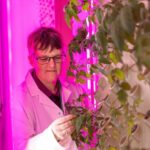Atmospheric sulphur dioxide levels hit historic high in Scotland following Icelandic volcanic eruption
Edinburgh, no stranger to an occasional haze, experienced an unprecedented atmospheric event on 31 May, unlike any seen over the past 30 years. While...
Geopolitical uncertainty, trade restrictions and divergence on AI ‘biggest risks’ to growth for global...
Businesses operating across borders are facing slowing growth and an increasing battle for long-term sustainability, according to a new report from KPMG International.
The findings...
Geothermal drilling gets underway at Stormont
Exploratory geothermal drilling and testing on the grounds of Stormont Estate has begun as part of Northern Ireland's Department for the Economy’s £3 million...
Royal Society of Chemistry calls for Chemicals Agency as report finds ‘regulatory chaos’ across...
The UK’s current system for chemicals regulation and management is inefficient, poor value for money and lacks long-term planning, according to the Royal Society...
AI solutions to sustainability challenges share £1 million as Manchester Prize names finalists
After a nationwide search and entries from all corners of the UK, the Manchester Prize has awarded £1 million to ten teams of advanced...
Buildng industry group calls for £64bn retrofit investment
The UK Green Building Council (UKGBC) has launched a policy manifesto for the next UK Government, urging it to invest nearly £64bn over the...
EarthCARE satellite launch promises improved understanding of how clouds and aerosols interact
The EarthCARE satellite was successfully launched into orbit on 29 May, announced by ESA with the promise that it “is poised to revolutionise our...
Report highlights risks to effectiveness of BNG legislation
There are risks to the long-term effectiveness of the government's new Biodiversity Net Gain (BNG) policy, launched in February, according to a 17 May...
Turning sludge into hydrogen, and other OFWAT award winners
Winners of OFWAT’s latest Water Breakthrough Challenge were announced on 16 May, and included a project to turn sewage sludge into hydrogen, and another...
Study maps human uptake of microplastics across 109 countries
Southeast Asian countries such as Indonesia, Malaysia and the Philippines top the global per capita list of dietary uptakes of microplastics, while China, Mongolia...
Clean growth and local government innovators showcased at ADEPT awards
At its annual President’s Awards on the 16th of May, the Association of Directors of Environment, Economy, Planning & Transport (ADEPT) recognised the achievements...
Bloomberg report: Urgent deployment of existing technology can get world close to net zero
Although prevailing wisdom holds that time is running out, BloombergNEF’s New Energy Outlook 2024 seemingly shows how the world could still achieve the major...
Engineering interventions that could reduce exposure of open-water swimmers to human faecal matter
Wastewater treatment must be improved to reduce exposure to human faecal pathogens in treated effluent, according to a new report published on 21...
Can coal mines be tapped for rare earth elements?
Research led by the University of Utah has documented elevated concentrations of rare earth elements (REEs) in active coal mines rimming the Uinta coal...
$3.7m crop lab will create food for ‘tomorrow’s atmosphere today’
A new $3.7m facility at the University of Essex aims to make it possible to adapt plants for a hotter drier climate, preventing threats...
Data scarcity challenges identification of endocrine disruptors
Lack of data from the chemical industry in the EU often prevents the assessment of whether substances used in consumer products, for example, are...
Electricity networks accelerate potential connection dates of over 200 clean energy projects
7.8GW of clean energy projects, more than double the output of Hinkley Point C nuclear power station, have had their connection offer dates brought...
The sins of the land are visited upon the sea
A new report attempts to better understand the provenance and impact of plastics in the ocean.
Launched ahead of Earth Day 2024 (22nd April),...
EU rules compel manufacturers to make repair easier
The European Parliament voted on 23 April to adopt new rules on the so-called “right to repair” for consumers, which aim to make it...
DRS to be delayed until 2027
The UK government has announced a delay to the scheduled October 2025 start date of a UK-wide Deposit Return Scheme (DRS), which will now...






















